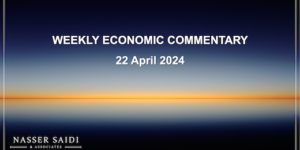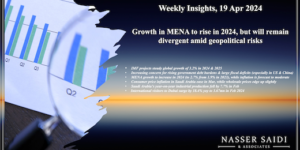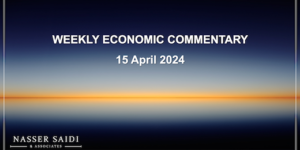Markets
Markets were relatively quiet this week, with the exception of Europe where the Moody’s action on Spain and Greece (placed on credit review for possible downgrade) and Ireland (downgraded by 5 notches) took its toll. Regional markets had an eventful week – Qatar stocks hit a new 26-month high (Tues) and DFM touched a 13-week low (Wed); compared to a week ago all markets bar Saudi closed at a lower level. The euro continued to fall against the dollar, while the pound fell after UK inflation and unemployment rose. Gold was volatile, closing lower compared to a week ago while oil prices are still hovering around the $87-90 band.
Global Developments
Americas:
- The FOMC said that the US economic recovery was still too weak to reduce unemployment, reaffirmed its commitment to its $600 bn QE2, and repeated that policy rates will remain “exceptionally low” for an extended period of time. The Fed added that the housing sector remained depressed.
- US CPI rose 0.1% mom in Nov, slightly below expectations. Core CPI also rose 0.1% mom. Consumer prices grew 1.1% yoy as expected.
- US retail sales recorded the fifth consecutive month of gains in Nov as sales climbed 0.8% mom to USD 378.7bn in Nov.
- Industrial production was up 0.4% mom in Nov, the biggest gain since July, while Oct data was revised down from no change to show a 0.2% loss.
- Initial jobless claims unexpectedly fell 3k to 420k in the week ending Dec 11. The four-week moving average of claims decreased to 422,750, the lowest since the week ended Aug. 2, 2008.
Europe:
- Moody’s placed Spain’s Aa1 rating under review for downgrade, citing high government, bank, and regional authority borrowing in 2011 in volatile conditions, plus potential bank recapitalization needs of €25-80 bn.
- Violent clashes broke out in Athens after Parliament approved a law sanctioning 10% wage cuts for the majority of public corporation workers, a condition of the EU/IMF program.
- Swedish Riksbank hiked policy rates 25 bp to 1.25% as expected.
- Eurozone industrial production rose 0.7% in Oct, rebounding from Sep’s 0.7% fall – the largest increases came from Luxembourg (6.4%) and Greece (3.6%) while Ireland witnessed the sharpest drop (4.8%).
- The ZEW institute’s confidence index for Germany rose to 4.3 points in Dec (Nov: 1.8) after a six-month slide previously, underscoring the steady recovery and positive sentiment in Europe’s largest economy.
- Eurozone flash PMI rose to 59.7 in Dec (Nov: 59.0), with Germany’s private sector growing at the fastest rate in four and a half years.
Asia and Pacific:
- Moody’s cut Vietnam’s sovereign rating from Ba3 to B1 (negative outlook) on concerns that macroeconomic instability could result from weaknesses in economic policy.
- The Bank of Japan’s Tankan business survey showed a decline in business confidence to +5 in Dec from +8 in Sep, registering the first decline in seven quarters. The decline was due to a worsening of business confidence among automakers and electrical machinery manufacturers.
- India’s central bank kept interest rates unchanged, but announced a two-pronged plan to inject more liquidity: a) by slashing the banks’ liquidity ratio by 100bp to 24%; b) buy up to INR 480bn worth of government bonds from the market over the next four weeks.
Bottom line:
While in the US some timid signs that policy measures are gaining traction (GDP in Q4 might be better than expected) in Europe the fiscal crisis is marred in political diatribe and patchy actions. The bond markets have started to price in the cost of fiscal profligacy with interest rates rising sharply all over the world. In Asia, Japan seems to have performed better than expected in 2010, although, given the parlous long term state of its economy, much remains to be done to.
Regional Developments
- Arab News reported that GCC bank earnings improved 2% in Q3, helped by a robust 12.43% drop in aggregate provision. However, improvement came exclusively from Saudi Arabia which recorded a 31.6% increase.
- Bahrain’s Ministry of Industry and Commerce announced that the country received around $1.5 million in FDI in just one week, as part of 22 new companies established in the country with a combined capital of around BHD1.057mn. (Source: Alayam newspaper).
- Qtel is in talks to form a joint venture with Qatar Investment Authority, which owns a 55% stake in Qtel, according to Reuters data to invest in foreign telecoms and IT sectors.
- Qatar Foundation has paid USD 198 mn for a shirt sponsorship deal with soccer giants FC Barcelona.
- Qatar is expected to spend $100 billion over the next five years on infrastructure projects including road and rail networks planned before it was chosen as host, as well air-conditioned stadiums. The country is not planning to issue bonds to finance these expenditures.
- Qatar Central Bank reported a decline of 11.2% in nominal value of GDP, with real GDP registering a positive growth of 8.6% during 2009 in its latest Annual Report. The decline in the nominal value of GDP was attributed to the decline in the gross product of the petroleum and gas sector by 23.1% for the first time.
UAE Focus
- Sheikh Mohammed has revamped the board for the Dubai World, appointing at the helm Sheikh Ahmed bin Saeed al-Maktoum – the ruler’s uncle, a key advisor and Chairman of Emirates Airlines. DW plans to sell assets over a period of eight years to generate as much as USD19.4 bn to pay off creditors.
- Nakheel plans to issue AED 6bn in Sukuk to suppliers by the end of January as part of its restructuring plan. Of the required 95% approval for the issuance of bonds, the company has already received approvals from more than 85% of its creditors, according to the Chairman Ali Rashid Lootah.
- The Central Bank of the UAE met with CEOs of banks to discuss the Credit Information Law and the proposed Credit Information Company among other banking related issues. A “follow-up” committee and a steering committee were formed to discuss the requirements for establishing the Credit Information Company.
- Emarat, Eppco and Enoc raised UAE diesel prices by 15 fils, taking the retail price of diesel per litre price to AED 2.75 from AED 2.60, also widening the price differential with petrol, which retails for AED 1.72 a litre.
- Etisalat has announced that they are seeking only a 40% stake in Zain as opposed to an earlier proposed 46%.





